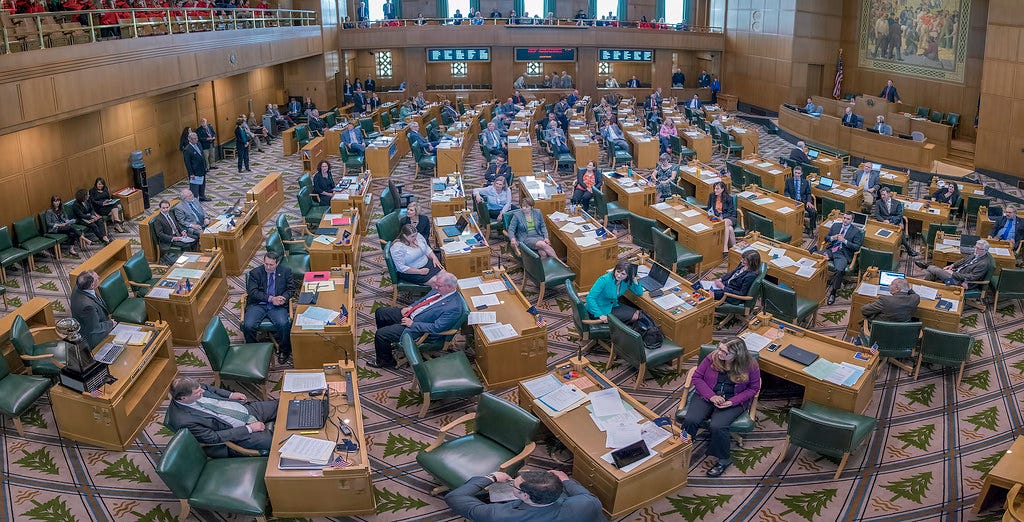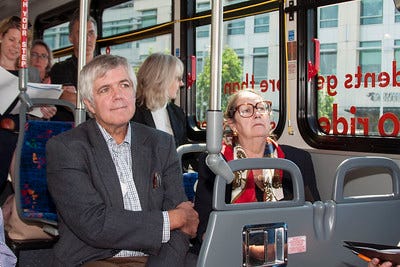Rich Vial: The Business of Politics or Good Governance—Those are Our Choices
The “sport” of politics has become a business with two competitors who increasingly fail to produce the product of good governance.
PARTISAN POLITICS IS NOT THE “PRODUCT” WE DESERVE NOR WHAT THE FOUNDERS INTENDED

"Oregon State Legislature" by acase1968 is licensed under CC BY-NC-ND 2.0
Ever since the Newt Gingrich revolution brought the gears of Congress to a standstill, partisan gridlock has been on full display both in DC, and across the nation in local and state legislatures. The traditional cross-aisle collegiality that dominated DC for the last 50 years is all but extinct, and it’s hard to find that collegiality in statehouses as well. In the void left by the death of compromise, parties alternate having control and, while they’re in the pole position, imposing their policy agenda at all costs.
This model has decimated our democracy’s ability to function at the federal and at the state level. Politics are no longer local. The partisan-based flaws that have destroyed our deliberative bodies at the federal level have tarnished our state politics, too. Politics is now simply big business, and we are no longer the customer. Good policy and effective oversight of governance, which should be the product of a successful legislature, are things of the past.
Applying economic analysis to our political system shows that we’re experiencing a market failure. In an expansion on their groundbreaking report—Why Competition in the Politics Industry is Failing America, Harvard professor Michael Porter and former CEO Katherine Gehl document in their recent book, The Politics Industry, the fact that the competition for the respective bases of our two parties has rendered them incapable of actually working together to enact legislation that unites us in a common effort to maintain the peace and provide for the common good. This war, funded by millions in unchecked campaign contributions and hyper-inflated lobbyist budgets, all but guarantees that the good of the community is the loser. Sadly, this is true at both the state and federal level.
“WIN AT ALL COST” COMPETITION HAS LED TO DYSFUNCTION IN THE CAPITOL
As the “sport” of politics has become a business with two competitors who increasingly fail to produce the product of good governance, the ability to engage in nuanced, thoughtful conversations about policy that culminate in negotiated, balanced policy has disappeared with each party instead looking out for its bottom line. That bottom line is not focused on good governance but rather the issues that will provide the most money and attention in an increasingly caustic war of words and deeds designed to embarrass the “other” side. Being seen as a “moderate” willing to compromise is a clear sign of disloyalty and the surest route to a short political career. You could say that being a moderate is a bad business model at a time of extremist politics.
Moderates don’t fare any better in Oregon, where partisanship has clearly been on full display. Supermajority control, which leaves the minority with few alternatives, has led to walkouts. These maneuvers have paralyzed the legislature over the last several years. And, while it is true that 75% of bills coming before the Oregon legislature receive broad bi-partisan support, that statistic does not reflect the fact that those are for the most part minor tweaks to existing law, leaving the big issues unaddressed as the gridlock persists. This again speaks to the fact that the parties as “businesses” don’t profit from taking risky stances on the audacious policies we need during these trying times.
The structural flaws of the current political market go beyond just having parties in control. These “businesses” aren’t the sort of organizations that encourage innovation. No, these businesses are top-down organizations with strict hierarchies that stifle creativity and morale. Partisanship is institutionalized in our state legislature, which means it comes as no surprise that our legislature is absolutely controlled by two people: the Senate President and the Speaker of the House. That pair determines virtually every action of the body, such as who sits on which committees, who leads those committees, what bills come before those committees, what bills get hearings in those committees, who gets to testify before those committees, and ultimately whether a bill even comes to the floor for a vote. These are all matters that essentially one person holds the power to determine. Both positions are absolutely determined by partisan priorities. Knowing their power, these two officials wield great influence and keep their “employees” in check. The penalty for a disloyal caucus member is being sidelined with no meaningful opportunity to participate, and, ultimately, a primary challenge that often means death to a political career.
This structure is ruining our potential to effectively govern. In my experience as a legislator, many of those elected for the first time come with a genuine desire to work on behalf of their constituents in crafting legislation for the betterment of all. They soon find, however, that institutional partisanship renders it impossible to do anything unless absolute loyalty is proven. Most of these individuals are good, thoughtful people who would make real contributions to their communities if they could break free of the partisan-controlled gridlock.
IT’S NOT SO MUCH WHO WE ELECT, BUT HOW AND THE SYSTEM THEY FIND THEMSELVES IN.
Other structural issues also limit our capacity to get good work done in Salem. Who we elect is driven by how we elect and how we elect our officials is broken – once again as a result of excessive partisan influence. The unwillingness of the two major parties to give up their monopoly on publicly funded elections makes it nearly impossible for those from the moderate middle to compete with the “base” at the left or right. Closed primaries and “first past the post” elections often leave us with a choice between two hard core partisan candidates at the edges of their respective ideologies.
Once elected, the use of public funds to finance partisan offices in the legislature impacts directly how the work gets done. Many millions are spent every year on office space and staff in the State Capitol so that the Republicans and Democrats can make sure their members are strong-armed into carrying out the agenda of the party. That agenda is to take whatever steps necessary to ensure that their members get reelected in order to grab or maintain control and power – the ultimate bottom line in the business of politics. As such, much of our legislative activity has become pure theater in furtherance of electoral narrative. And while the funding of the office of the Senate President and the Speaker are in theory to support the work of the legislature, in essence these are just extensions of the caucus offices.

"Sen Johnson and Rep Bentz listen during Medford tour" by OregonDOT is licensed under CC BY 2.0
GENUINE ALTERNATIVES EXIST TO THIS DYSFUNCTIONAL REALITY
While many assume that the two-party system is inevitable, Porter and Gehl argue otherwise. Our system was not intended to be controlled by two “businesses.” Partisanship was the feature of political process that was most feared by the Founding Fathers at the birth of a new nation. In his farewell address to the nation, George Washington adamantly warned against the tyranny that would result from allowing partisanship to control our government. The Constitution says nothing about parties. All of the rules, funding and control afforded the parties in the legislative process is the product of the legislators themselves. In other words, we created these businesses, so we can also bring them to an end.
We can improve our democracy by untethering our democratic institutions from partisan control. Oregon has a long history of making this sort of innovation happen. From the Bottle Bill to actively joining the leaders of women’s suffrage, Oregon has consistently shown that it is capable of challenging the status quo in furtherance of the common good. It is time for Oregon once again to show true leadership by rejecting the perpetuation of the business of politics, which exists solely to keep the two parties in business, and return to a system that produces real leadership and the adoption of policies that unite and benefit all Oregonians.

"ranked choice voting pictures.jpg" by janinsanfran is licensed under CC BY-NC-ND 2.0
Here is how we do it:
Open primaries with ranked choice voting. If a majority of us really fall in the middle, give us a chance to elect legislators who are committed to finding that sweet spot between the extremes.
Consolidate districts to allow for multiple representatives. This is not a new idea, and was the rule early in America’s experiment with democracy. Elect three from each of Oregon’s senate districts, with the top vote getter going to the Senate and the next two to the House using ranked choice voting. By doing so, every district and thus every voter has a chance at a representative that reflects their values, and expands the diversity of views in the legislature.
Eliminate partisan labels for sitting legislators. Defund partisan offices in the legislature. Elect the leaders by the entire body via secret ballot to avoid the punishment of disloyalty. Elect committee chairs by the entire body. Allow a committee on committees to appoint members to the various committees. Allow the committees to control their agendas. Allow bills to come to the floor by vote of the members and not at the whim of the leader.
My third suggestion has actually been the Nebraska Unicameral legislatures system for roughly 90 years. Nebraska has produced some of the most innovative and progressive legislation in the country, even though it is considered a traditionally red state. A simple set of rule changes by the Oregon legislature could make this happen. Implementation of suggestions one and two would require a change to the statute, but again, easily done with legislative will.
We need not be so naïve as to think that parties will not continue to exist. People will always look to join with others who agree, and seek to gather support for positions. Even if we didn’t apply a label to our legislators, it is likely that we would still have a pretty good idea of their ideologies and affiliations. But if we had legislators providing an example of how to work without starting with the label, it would help our whole society to heal the rift that is destroying our communities.
Is it not likely that our current leaders will give up any of their power by implementing the above suggestions. And, of course, “It’s always about the money,” and if we do not take steps to limit the billions spent on the electoral contest, it will be difficult to quiet the mob that insists that the two-party system is our only choice. But perhaps the reality of our appalling lack of governance in the face of the multiple crises of 2020 will wake us up to the need to fundamentally change the system. Perhaps it is time for a citizen initiative to specifically address the damage that partisanship is doing to our society. After all, that is the Oregon Way!



